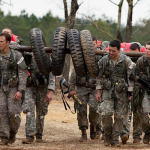Growing up, despite my best attempts not to listen, the elders taught me nothing worth anything ever comes without a great price being paid. That is, the really big things in life, the really important things, life-changing things, never come easy. No matter whether it changes the course of a single life, team, family, a community, or humanity as a whole. No matter which, a great price must be paid in order to accomplish these things, a great personal expense must be perpetually expended over protracted periods of time. With the very real chance of failure, of losing it all and starting all over again, facing you at every single turn along the path.
Perhaps this is because, as Malcolm Gladwell wrote in his 2008 book Outliers, it takes as many as 10,000 hours (5 years) to master something, 10,000 hours of paying a heavy price. 10,000 hours of making mistakes, minor progress, hitting obstacles, having to change directions, at times coming to a complete stop before being forced to rethink the entire purpose and strategy. A million times questioning the importance of the journey and the destination, your abilities, at times remaining resolute, at times walking away only to find you are quite by accident yet on the very same path.
In part, this may be because success in anything is never a straight line, more of an apparently random quantum walk, with course corrections and forward progress only possible as experience is gained through practice and doing over time. A million unpredictable actions and reactions, multidimensional paths pursued simultaneously, in order to perhaps one day obtain the objective. An objective that is never truly quite clear when starting the journey, or really at any point along the journey, though becoming steadily clearer as one crosses the 5,000-hour mark. That is if one never quits.

There is pushback against Gladwell’s work, research which concludes ultimate success as a master of a domain is less dependent on 10,000 hours of study and practice than thought. A Princeton study of 88 studies on deliberate practice showed practice only accounted for 12% of ultimate success. The researchers go on to argue the 10,000 hours rule only applies in highly stable disciplines, such as math, science, and other structured systems. They argue that in such domains as entrepreneurship, the 10,000 hours of disciplined study and practice do not account for much at all. One of their arguments is Richard Branson and his path to becoming one of the world’s leading entrepreneurs through setting world records.
Gladwell rebuts this, however, stating he was misinterpreted, and that the true meaning of his 10,000 was lost in simplification. He states, “I could play chess for 100 years and I’ll never be a grandmaster. The point is simply that natural ability requires a huge investment of time in order to be made manifest. Unfortunately, sometimes complex ideas get oversimplified in translation.” There is truth in his statement. Both nascent talents take time to develop, and things get lost in simplification. Einstein was a patent clerk as he put in the last part of his 10,000+ hours and how many all the way up through today have ever truly understood, E=MC2?
What is to say Richard Branson was not doing exactly that, putting in his 10,000 hours to becoming a successful entrepreneur, all the while chasing his world records? To be a successful entrepreneur does one have to put in 10,000 hours of business-specific study and practice, is there a set curriculum per discipline? Or is there something other denotes a future master, particularly a master entrepreneur? It would be interesting to know how many of the researchers had actually founded their own startup and gone through the 10,000-hour journey themselves for anything more than their statistics degrees. More fundamentally, what does it mean to be an entrepreneur, and what kind of study and practice must one put in to realize mastery? Many successful entrepreneurs have zero business background and come from virtually every domain there is, often domains completely unrelated to their entrepreneurial venture.
Perhaps it doesn’t matter really what the exact course of 10,000-hour study is that leads to a master entrepreneur. Maybe there simply isn’t one. It would seem a good portion of that study would be in social dynamics and human interaction, things are not easily quantifiable in statistical models, but quite easy to see in practice. It could be argued, for the entrepreneur, the majority of this five-year block of study should be in refining a vision, of defining it in incredible complexity such that it is tested and proven, defensible, then reducing it to absolute simplicity such that others can see it, get it, buy into it and drive it themselves.
And at the heart of this is an absolute necessity to never quit anywhere along the journey. When no one else can see it but you. When it is too complex for others to accept and you are being told it can’t be done. When you are losing friends and family relations due to your focus on this single thing, this vision as to how to change the world, no matter whether for one or many. This takes a kind of confidence, an inner strength really only obtainable through 10,000 hours or more of dedicated study and practice, of making mistakes, of getting it wrong, of risking it all, of being turned down and ridiculed, of being isolated and alone, of minor victories only you can see.
There seems to be a constant among those few who actually go on and dedicate these hours of study and practice necessary to obtaining true inner strength and real confidence. And that is an inability, not an unwillingness but an inability, to quit. So much in our modern society provides the ready-made, easy, and socially acceptable excuse to quit. Most do, at one point or another in their lives. But not the master of a domain, not the one who put in the 10,000 hours necessary for the student to become the master and by becoming the master, to understand they are once more only a student. These few, regardless of their discipline or domain, even if not the one in which they ultimately find their real success, these few never quit.
Post-9/11, At the age of 42 I went into the Army to join and serve with Special Forces. Having been a lifetime martial artist and dedicated student of Buddhism, and having had more than one entrepreneurial and later investor failure behind me, I was well versed in the concept of never giving up. Or so I thought. In the grueling three-week Special Forces Assessment and Selection and only slightly less grueling 18 months of the Special Forces Qualification Course after, I learned the difference between an unwillingness to and an inability to quit.
Those with an inability at some point were pushed beyond their willingness limit and would go on to quit, in one way or another, despite many of these having real talent and ability. While those who could not quit, many with far less talent and ability, virtually always succeeded. It was obvious who had and who had not put in the 10,000 hours of dedicated study and practice, regardless of their domain of mastery. Only those who had, regardless of whether they possessed vast or very little nascent talent, succeeded.
Startup leaders are no different and we seek out those, regardless of the level of talent, who have or who are putting in those 10,000 hours, whether their path is an obvious or indirect one, whether complete or somewhere past the halfway mark. We don’t care about the domain in which this mastery is being pursued or its direct applicability to the entrepreneurial venture. We are looking at their leadership. Mastery is mastery. Represented not as knowledge alone, but as an incredibly deeply ingrained, experience-backed confidence only obtainable through actually having done. In essence, when assessing our future startup leaders, we at Emerio seek to identify one thing, and one thing above all others. And that is if this particular leader has an unwillingness or an inability to quit.
Special Forces TACs and Team Sergeants are masters of this skill. And while I learned the important lesson of the importance of accepting the heavy price to be paid for contributions from my elders, it was from Special Forces leaders I gratefully learned how to identify those who have accepted this price. Special Forces taught me, those with an unwillingness to quit will stubbornly stick to a given course of action or will be easily thrown off balance by the possibility of uncertainty. While those who are unable to quit will simply take what is thrown at them, make quick adjustments, accept the new reality, and keep moving forward, resolute and confident in uncertainty.
Want to change the world for yourself, your family, your community, and mankind? Put in the 10,000 hours it takes to obtain the first level of master. Once more become the student and commit to putting the tens of thousands of hours more to obtain successfully higher levels of mastery. But more, don’t be unwilling to quit, develop an inability to quit. Those who obtain the ultimate success in life are those who are not only willing but who have actually paid any price necessary to develop their own domain mastery and then apply it to success. Doesn’t matter your domain of study and practice. Only that you never once quit. No matter how long it takes or how high the price goes.
____________________
This article first appeared in The Havok Journal on July 21, 2018.
E.M. Burlingame is a Silicon Valley techpreneur and later Private Equity investor and Investment Banker with an emphasis on very early-stage technology companies. Having recently completed active duty service with 1st BN 1st Special Forces Group, E.M. is now serving with 20th. E.M. is currently Founder of the Honos Foundation, a non-profit dedicated to empowering local entrepreneurship in violence repressed areas, and Founder and Managing Director of Emerio Group, an early-stage investment advisory. Following a degree in Strategic Studies and Defense Analysis at Norwich, he is now pursuing PhD studies in Interdisciplinary Engineering, with an emphasis on Computational Engineering at the University of Alabama at Birmingham.
As the Voice of the Veteran Community, The Havok Journal seeks to publish a variety of perspectives on a number of sensitive subjects. Unless specifically noted otherwise, nothing we publish is an official point of view of The Havok Journal or any part of the U.S. government.
Buy Me A Coffee
The Havok Journal seeks to serve as a voice of the Veteran and First Responder communities through a focus on current affairs and articles of interest to the public in general, and the veteran community in particular. We strive to offer timely, current, and informative content, with the occasional piece focused on entertainment. We are continually expanding and striving to improve the readers’ experience.
© 2024 The Havok Journal
The Havok Journal welcomes re-posting of our original content as long as it is done in compliance with our Terms of Use.




